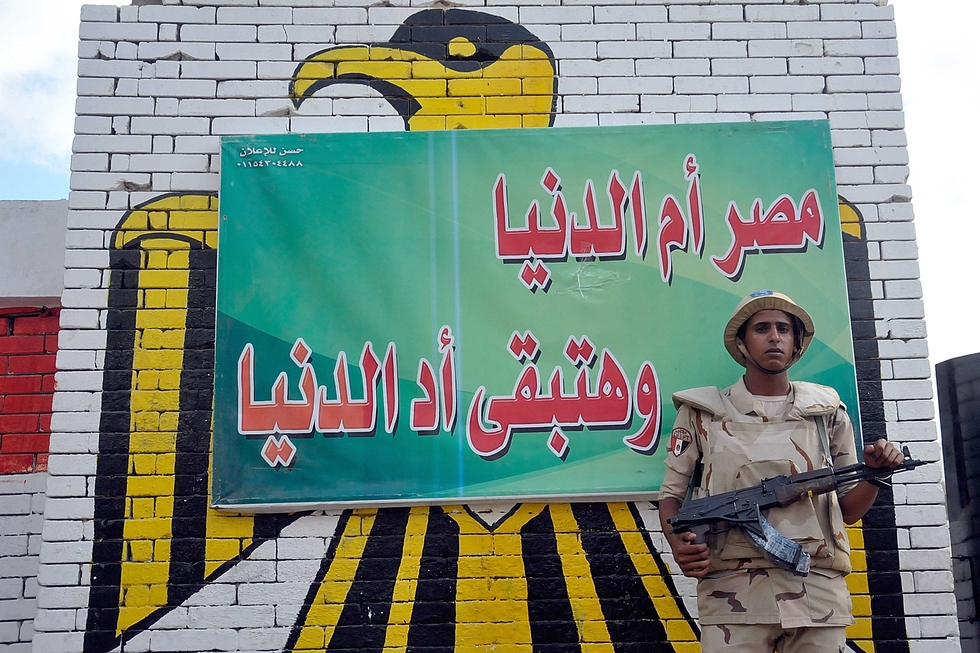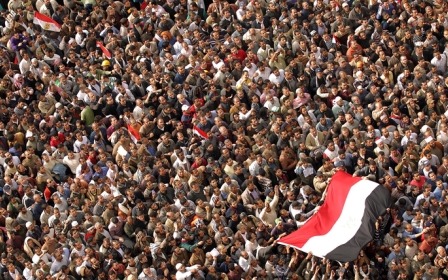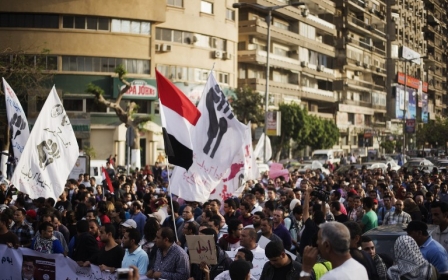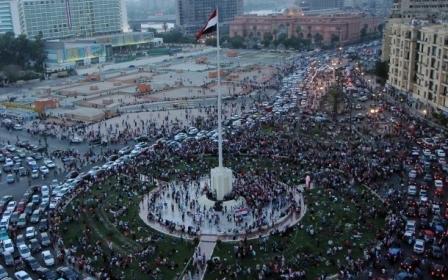Egyptian revolution: 5th anniversary in a plundered Middle East

As the anniversary of Egypt's 25 January revolution anniversary arrives, Egypt is once again mired in controversy.
It was five years ago when millions marched in the streets and squares of Egypt demanding regime change, chanting “Ash-shaab yurid isqat al nitham” (“the nation wants the toppling of the regime”), demanding Mubarak, Egypt’s ruthless dictator of more than 30 years, step down. A few days before the fifth anniversary the same slogan took Twitter by storm, making it the most shared hashtag in Egypt and several other Arab countries.
The regime today has once again made 25 January the national day of police, in defiance of public sentiments in favor of the 25 January revolution. The very same day people refused to celebrate but protested in remembrance of police brutality and abuse.
Fast forward from 2011 to the period after Egypt appointed its first elected president in June 2012. The country was faced with economic challenges exacerbated by the deliberate trouble-making of the deep state and Mubarak’s crony class that was wary of the new rising elite in Egypt.
These included reducing the oil supply in the market for trucks and cars forcing long queues to fill gas tanks, and electricity cuts which soon disappeared after Mohamed Morsi was sacked. The Muslim Brotherhood proved to be naïve not to realise the graveness of what awaited them and poor in political manoeuvring, unable to unite factions that stood on the same side during the revolution.
In a blatant display of bizarre naivety, the mother of Khalid Said - whose death sparked protests on 25 January - marched with the police on the 30 June 2013, hugging young men who bore the same uniform who killed her son. It should be recalled that not a one single policeman was convicted in the hundreds of deaths or the tens of thousands injured or blinded during the 25 January protests leading to Mubarak’s step down.
Had the military not intervened to sack Morsi, parliamentary elections were just around the corner and dissent could have been expressed in a constitutional way where the parliament could have voted for early presidential elections, but quite obviously, and to the misfortune of all participants of the 2011 revolution, the army had other plans.
Today prisons have expanded to accommodate more dissidents, including those who protested against Morsi. A new farcical parliament is in place where the head of the human rights committee, in the not so distant past, said in a televised interview in defence of detaining the relatives of political fugitives: “Whoever speaks to me about human rights I will beat him with a shoe.”
No wonder Egypt’s minister of foreign relations a few days ago was grilled on a German TV programme while attempting an eloquent response to questions about Egypt’s poor record on human rights and political freedoms.
The bigger picture
Zooming out of Egypt and putting the country in an international context contributes to understanding the region as a whole, and what the Egyptian Revolution is facing.
Tony Blair, prime minister for 10 years and the leader who decided the UK should join the US invasion of Iraq, in a speech before Bloomberg London roughly a year after the coup in Egypt said:
“On the fate of Egypt hangs the future of the region. Here we have to understand plainly what happened. The Muslim Brotherhood government was not simply a bad government. It was systematically taking over the traditions and institutions of the country. The revolt of 30 June 2013 was not an ordinary protest. It was the absolutely necessary rescue of a nation. We should support the new government and help…. We should mobilise the international community in giving Egypt and its new president as much assistance as we can,”
Never mind that Blair was official envoy of the Middle East Quartet that overlooks the Palestinian-Israeli “peace process” when he gave that speech in support of a military coup; it just shows the kind of correlation between policy choices of Western officials that influence much of what the Middle East has become today.
Blair was brave enough to bluntly say what many refuse to openly profess: the conviction that the Middle East should not be allowed to simply govern itself; it needs to be manipulated to the advantage Western interests. The US never called Morsi’s removal a military coup and continued to provide military aid to Egypt. It was business as usual.
After all, Mubarak was let to go with much worry and regret, as he was always seen as a vital ally in the region. Two days after the 25 January, 2011, Joe Biden, vice president of the US further elaborated on the US view of Mubarak: “I would not refer to him as a dictator.”
Today Sisi is getting the support he needs despite the odds; politically he is greeted in European countries while Egypt has recently been given the lead to head the Counter Terrorism Committee on the UN Security Council. Moreover, economically his regime is paid for by the Gulf monarchies with the encouragement of the West, as seen at the Sharm el-Sheikh Economic Development Conference of March 2015, and with perhaps more aid to come from the IMF.
It does not matter how Egypt has conducted its affairs - in the end it still gets unconditional support from the US; or perhaps support that is conditioned solely around preserving US interests in the region, which the Egyptian army has become so conditioned to serve.
Said El-Assar, a previous member of the Supreme Council of the Armed Forces, once said at the United States Institute of Peace, Washington DC: “In the military to military relationship, we have marvellous relations, and we consider it the pillar and the cornerstone of the entire relations between the United States and Egypt.” He added: “We are proud that our contribution in the strategic dimension to the United States’ interest is tremendously important.”
President Sisi was asked in New York in an interview aired by PBS: “Do you trust the United States as a reliable ally?” He replied “Undoubtedly, it goes without saying, the United States has never let us down throughout the past years.”
Whether it was Iraq in the past, Egypt today, or elsewhere, the US and Western policies in the region are wrecking it and will have major consequences in the future, as observers warned more than 10 years ago prior to the invasion of Iraq.
The Egyptian Revolution could have not taken such a massive blow in 2013 without the external support and acceptance of what the Egyptian military was doing.
Egypt is not a small country where ignoring it is like sweeping it under the carpet. Whatever happens in Egypt sends shockwaves throughout the region, whether it’s emboldening dictators against dissent or encouraging further insurgency. In any case the end result is not sweet and dandy as Tony Blair might claim.
The French Minister of Defence has rightly stated that it shouldn’t be ruled out that the Middle East could plunge into total chaos. No wonder, the French presidency announced an economic aid package for Tunis worth a billion euros hours after protests swept the country a few days ago.
On the other hand, the military in Egypt has been deployed in all the main squares, armed to the teeth in preparation for the fifth anniversary of the 25 January revolution.
The current regime wants to be sure that there won't be any surprises. However the dissent this time is unprecedented and a few protests here and there have already taken place, which may be emboldened by the events in Tunis, just as they were in 2011. In any case, if no change is to be brought about soon, we will still be discussing the 25 January revolution for many anniversaries to come.
- Mustafa Salama is a political analyst, consultant and freelance writer. Salama has extensive experience and an academic background in Middle East Affairs.
The views expressed in this article belong to the author and do not necessarily reflect the editorial policy of Middle East Eye.
Photo: An Egyptian soldier stands guard at a polling station in the Mediterranean city of Marsa Matruh on 18 October, 2015, with an Arabic writing on placard reads "Egypt is the cradle of civilization and it shall remain as large as the word" (AFP).
New MEE newsletter: Jerusalem Dispatch
Sign up to get the latest insights and analysis on Israel-Palestine, alongside Turkey Unpacked and other MEE newsletters
Middle East Eye delivers independent and unrivalled coverage and analysis of the Middle East, North Africa and beyond. To learn more about republishing this content and the associated fees, please fill out this form. More about MEE can be found here.





